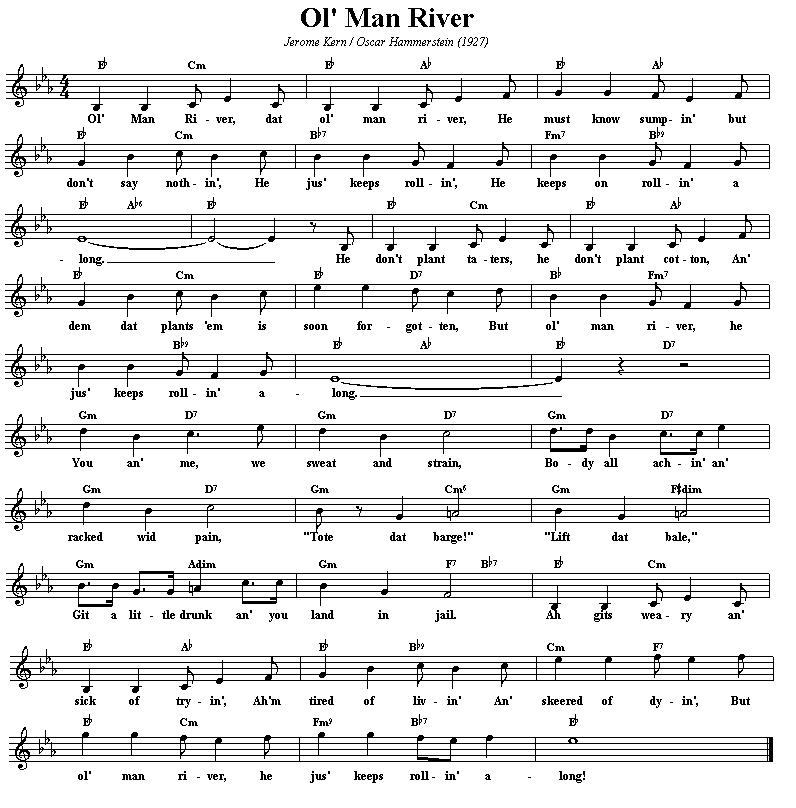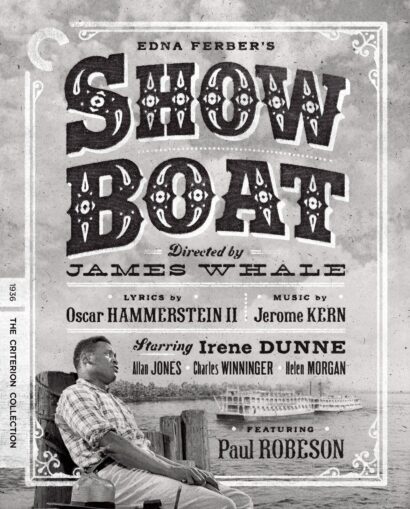"Ol' Man River"... Who Should Sing It?
The History of "Ol' Man River"
The song, "Ol' Man River" is perhaps one of the most recognized songs in the 1927 Show Boat production. The combination of Jerome Kern's music, Oscar Hammerstein's lyrics, and Paul Robeson's memorable voice has led the song out of the 1920s and into the 21st century where it is still very well known and listened to today.
Underlying Message & Lyrics
Although it seems to be a song devoted to the Mississippi River (hence the name, "Ol' Man River"), it possesses an underlying message about race and the endless struggles that African American individuals face. The river continues flowing, similar to life - regardless of the hardships and troubles that come their way. However, the river flows freely, but the same cannot be said for the individual that sings the song, nor other African Americans in the 1920s. The lyrics hint towards being envious of the river, which can flow away from the troubles in Mississippi, while others are trapped.

Lyrics that display African American struggles:
"Here we all work while the white folk play"
"You don't das make the boss man frown"
"Let me go 'way from the white man boss"
Lyrics about the River "rolling along" freely:
"He don't say nothin', but he must know somethin"
"But ol' man river, just keeps rollin' along"
"He don't plant tatters, and he don't plant cotton"
Lyrics about life "rolling along" not so freely:
"I gets weary, and sick of trying"
"I'm tired of livin', but I'm scared of dyin"
"Let me go 'way from the Mississippi"
Who was "Ol' Man River" Meant For?
The Character Joe
"Ol' Man River" was intended for a very specific character: Joe, a dock worker on the Cotton Blossom. He is married to Queenie, the Cottom Blossom cook. Joe performs "Ol' Man River" while sitting on the dock and is supported by an African American chorus. The song is then sung multiple times throughout the rest of the production.

Paul Robeson as Joe
Who Should Be Performing "Ol' Man River"?
Although other African American performers have played the role of Joe or performed "Ol' Man River" througout the years after Show Boat first debuted, many well-known white performers, both male and female, have also recorded their own adaptations of the song. Performers such as Bing Crosby, Judy Garland, and Frank Sinatra have put jazz, pop, or soul twists on the traditional "Ol' Man River". However, there has been much debate over who should be recording and performing this song that was intended for a specific role and to portray a certain message about the struggles of daily life for African Americans in the 1920s. There was a specific dialect used in the original song that has been changed or altered over time based upon the performer, the audience, and the time frame. There is also an issue with the changing of a solemn, hopeful, dispairing song into a more upbeat, commercialized tune. The original music accompanies the lyrics, which are meant to be emotional and powerful. However, later recordings put less emphasis on the lyrics (which were often altered) and more emphasis on the music and the popular white performers - taking away from the racial themes that are meant to be explored in the song.
Ultimately, the song "Ol' Man River" explores racial themes and histories, much like the entirety of the Show Boat production. Hiring white performers to record and perform this song becomes problematic in the sense that it is shaped by the African American experience, which these white individuals have not experienced or struggled with themselves. African American performers such as Paul Robeson utilized "Ol' Man River" for activist goals and to challenge racial issues in America, whereas white performers seemingly utilize it for entertainment purposes and to further their personal careers. The deep, important meaning behind the lyrics is not explored through these performances, and therefore the message that it possesses is not expressed in the same way that it is through Joe's performance in the Show Boat production.
(Frank Sinatra performs "Ol' Man River")


Hi Audrey! I really loved your post and the way that you took the reader through the history of "Ol' Man River." Your analysis was really thoughtful and I liked that you brought up how changing the song into a more upbeat tune makes it more commercialized and takes away some of the original meaning. I think that's really interesting because in someways the song was already commercialized as part of a broadway show.
ReplyDelete